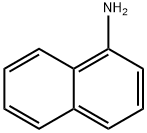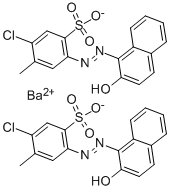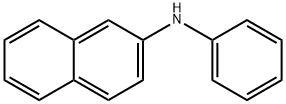A6259712
β-Naphthylamine , 98% , 91-59-8
Synonym(s):
β-Naphthylamine;2-Aminonaphthalene
CAS NO.:91-59-8
Empirical Formula: C10H9N
Molecular Weight: 143.19
MDL number: MFCD00004112
EINECS: 202-080-4
Update time: 2022-07-08
PRODUCT Properties
| Melting point: | 111-113 °C(lit.) |
| Boiling point: | 306 °C(lit.) |
| Density | 1.061 g/mL at 25 °C(lit.) |
| vapor pressure | 2.56 x 10-4 mmHg at 20–30 °C (quoted, Mercer et al., 1990) |
| refractive index | 1.5000 (estimate) |
| storage temp. | -20°C Freezer |
| solubility | Solubility Soluble in hot water, ethanol, ether |
| pka | 4.16(at 25℃) |
| form | powder |
| color | pink to purple |
| PH Range | Non& uorescence (2.8) to violet & uorescence (4.4) |
| Water Solubility | <0.1 g/100 mL at 22 ºC |
| Merck | 13,6425 |
| BRN | 3939429 |
| Henry's Law Constant | 2.01 x 10-9 atm?m3/mol at 25 °C (quoted, Mercer et al., 1990) |
| Exposure limits | Since it is a carcinogen, there is no TLV TWA for this compound. Recognized Carcinogen (ACGIH); Carcinogen (OSHA);
Human Sufficient Evidence (IARC). |
| Stability: | Stable. Incompatible with strong oxidizing agents. |
| Major Application | Microelectronics, power transmission & fluid, insulators for electronic devices, photoresists, display device, imaging process, semiconductors, diesel fuel additives, battery, adhesive, paints, inks, chalk, leather, textiles, dye synthesis, soil products |
| InChIKey | JBIJLHTVPXGSAM-UHFFFAOYSA-N |
| CAS DataBase Reference | 91-59-8(CAS DataBase Reference) |
| IARC | 1 (Vol. 4, Sup 7, 99, 100F) 2012 |
| NIST Chemistry Reference | 2-Naphthalenamine(91-59-8) |
| EPA Substance Registry System | 2-Naphthalenamine (91-59-8) |
Description and Uses
2-Naphthylamine was widely used in themanufacture of dyes and in rubber. Currently, its use is curtailed because of thehealth hazard.
Safety
| Symbol(GHS) |    GHS07,GHS08,GHS09 |
| Signal word | Danger |
| Hazard statements | H302-H350-H411 |
| Precautionary statements | P201-P273-P301+P312+P330-P308+P313 |
| Hazard Codes | T,N |
| Risk Statements | 45-22-51/53 |
| Safety Statements | 53-45-61 |
| RIDADR | UN 1650 6.1/PG 2 |
| WGK Germany | 3 |
| RTECS | QM2100000 |
| HazardClass | 6.1(a) |
| PackingGroup | II |
| HS Code | 29214500 |
| Hazardous Substances Data | 91-59-8(Hazardous Substances Data) |
| Toxicity | LD50 (intraperitoneal) for mice 200 mg/kg (quoted, RTECS, 1985). |




